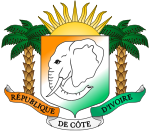- National Assembly of Côte d'Ivoire
-
Côte d'Ivoire 
This article is part of the series:
Politics and government of
Côte d'Ivoire- Constitution
- President
- Prime Minister
- National Assembly
- Speaker
- Elections
- Political Parties
- Subdivisions
- First Civil War
- Second Civil War
- 2010–2011 Ivorian crisis
- UNOCI
- Foreign relations
The National Assembly of Côte d'Ivoire is Côte d'Ivoire's unicameral legislative body. Evolved from semi-representative bodies of the French Colonial period, the first National Assembly was constituted on 27 November 1960 with 70 elected member (députés) in accordance with the Constitution of 31 October 1960, which created the First Republic.
Legislative power in Côte d’Ivoire is exercised by Deputies elected from Constituencies (Circonscriptions) by a Scrutin de Liste or Plurality-at-large voting which has neither a proportional representation or panachage element common in many such systems.[1] The powers of this Assembly expire at the end of its second regular session (session ordinaire) in the fifth year of its mandate. The Assembly is then reformed by election from candidates who must be Ivorian citizens of 25 years or older who have never renounced their Ivorian nationality.[2]
The 1st National Assembly of the Second Republic of Côte d’Ivoire elected for the period 2000-2005 was marked by both internal political crisis and the Ivorian Civil War. No elections were held in 2005, but with the peace deal ending the Civil War, elections are expected on 30 November 2008.[3] The current National Assembly is made up of 225 elected officials, with Mamadou Koulibaly (FPI) as the current president.
Summary of the 10 December 2000 and 14 January 2001 National Assembly of Côte d'Ivoire election results Parties Votes % Seats Ivorian Popular Front (Front populaire ivoirien) . 96 Democratic Party of Côte d'Ivoire (Parti démocratique de la Côte d'Ivoire) . 94 Rally of the Republicans (Rassemblement des républicains) boycott 5 Ivorian Workers' Party (Parti ivoirien des travailleurs) . 4 Union of Democrats of Côte d'Ivoire (Union des Démocrates de Côte d'Ivoire) . 1 Movement of Future Forces (Mouvement des Forces de l'Avenir) . 1 Non-partisans . 22 Vacant . 2 Total (turnout 33.1%) 1,547,798 225 Source: CNE. These elections were boycotted by the Rally of the Republicans (Rassemblement des républicains) See also
- History of Côte d'Ivoire
- Legislative Branch
- List of national legislatures
- List of Presidents of the National Assembly of Côte d'Ivoire
References
- ^ Loi N° 2000-514 du 1er août portant code électoral, article 68.
- ^ Loi N° 2000-514 du 1er août portant code électoral, article 71.
- ^ Poll expert sees Ivory Coast elections delay. Reuters, Ange Aboa, 04 Aug 2008.
- Portions of this article were translated from the French language wikipedia entry fr:Assemblée nationale (Côte d'Ivoire), 2008-08-18.
Sovereign states Algeria · Angola · Benin · Botswana · Burkina Faso · Burundi · Cameroon · Cape Verde · Central African Republic · Chad · Comoros · Democratic Republic of the Congo · Republic of the Congo · Côte d'Ivoire · Djibouti · Egypt · Equatorial Guinea · Eritrea · Ethiopia · Gabon · The Gambia · Ghana · Guinea · Guinea-Bissau · Kenya · Lesotho · Liberia · Libya · Madagascar · Malawi · Mali · Mauritania · Mauritius · Morocco · Mozambique · Namibia · Niger · Nigeria · Rwanda · São Tomé and Príncipe · Senegal · Seychelles · Sierra Leone · Somalia · Somaliland · South Africa · South Sudan · Sudan · Swaziland · Tanzania · Togo · Tunisia · Uganda · Western Sahara · Zambia · Zimbabwe
Dependencies,
autonomies,
other territoriesCanary Islands / Ceuta / Melilla (Spain) · Madeira (Portugal) · Mayotte / Réunion (France) · Saint Helena / Ascension Island / Tristan da Cunha (United Kingdom) · Zanzibar (Tanzania)
Italics indicate an unrecognised or partially recognised state.Categories:- Politics of Côte d'Ivoire
- National legislatures
- Unicameral legislatures
Wikimedia Foundation. 2010.

